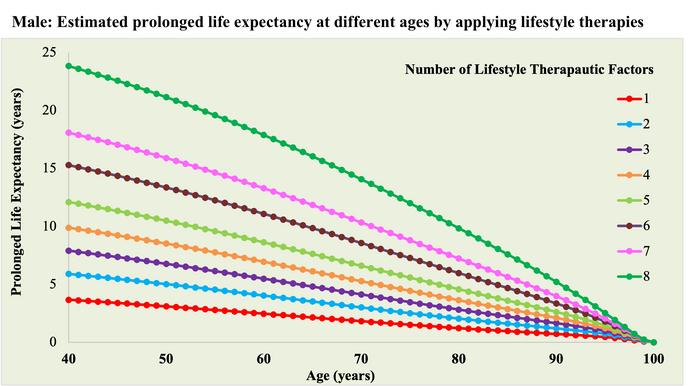What if you could add not just a few more years, but entire decades of vibrant, healthy life to your future? Imagine having an extra 24 years to spend with family, pursue passions, and experience the world. This isn’t a far-fetched dream from a science fiction novel.
It’s the stunning conclusion of a massive new study that offers a clear, evidence-backed roadmap to a dramatically longer life. You can start today, and it’s simpler than you think.
Here are eight straightforward lifestyle habits that, when adopted, have the power to add decades, not just years, to your life and are largely within your control.
Contents
- 1 Here’s What You Need to Know
- 2 The Eight Pillars of Longevity at a Glance
- 3 1. Get Active: The Single Most Powerful Habit
- 4 2. Avoid Opioid Addiction
- 5 3. Never Smoke: The Gift of Clean Lungs
- 6 4. Manage Stress: Protect Your Mind and Body
- 7 5. Eat a Plant-Forward Diet
- 8 6. Avoid Binge Drinking: A Clear Line on Alcohol
- 9 7. Get Good Sleep: The Ultimate Restoration
- 10 8. Foster Positive Social Relationships
- 11 Your Plan to Add Decades, Not Just Years
Here’s What You Need to Know

A landmark study presented at NUTRITION 2023, the annual meeting of the American Society for Nutrition, has quantified the profound impact of daily choices on longevity.
Researchers analyzed data from the Million Veteran Program, a massive longitudinal study involving nearly 720,000 U.S. veterans aged 40 to 99. The findings are nothing short of revolutionary.
Men who adopted all eight healthy habits by age 40 were predicted to live an average of 24 years longer than men who adopted none. For women, the predicted gain was a remarkable 22.6 years!
The study, which tracked 33,375 deaths during its follow-up period, found an 87% relative reduction in all-cause mortality for those who embraced all eight lifestyle factors compared to those who adopted none.
Perhaps the most empowering message is that it’s never too late to start. Adopting these habits at age 50 could still prolong life by up to 21 years. Starting at age 60 could add nearly 18 years! As lead study author Xuan-Mai Nguyen stated, “The earlier the better, but even if you only make a small change in your 40s, 50s or 60s, it still is beneficial”.
The Eight Pillars of Longevity at a Glance

This table provides a concise summary of the core findings, detailing each habit and its associated reduction in the risk of premature death.
Lifestyle Habit
Associated Reduction in Risk of Early Death
Brief Definition/Parameter
1. Being Physically Active
46%
7.5+ metabolic equivalent (MET) hours per week
2. No Opioid Addiction
38%
No history of opioid use disorder
3. Never Smoking
29%
Never having been a regular smoker
4. Managing Stress
22%
Minimal chronic stress, effective coping strategies
5. Plant-Forward Diet
21%
High intake of whole grains, fruits, vegetables
6. Avoiding Binge Drinking
19%
Consuming no more than 4 alcoholic drinks per day
7. Good Sleep Hygiene
18%
7-9 hours of quality sleep per night, no insomnia
8. Positive Social Relationships
5%
Having a strong, supportive social network
*Data sourced from the Million Veteran Program study analysis presented at NUTRITION 2023.
While the study shows a strong association, it is observational and does not prove direct cause and effect. Additionally, because the cohort consisted of military veterans, the findings may not translate perfectly to the general population.
However, the study’s large and diverse population gives its conclusions significant weight. Let’s explore each of these life-changing habits in detail.
1. Get Active: The Single Most Powerful Habit

To add decades, not just years to your life, movement is non-negotiable. Physical activity emerged as the most impactful habit, slashing the risk of death from any cause by an incredible 46% compared to being sedentary.
The study set a specific, achievable target: 7.5 metabolic equivalent (MET) hours of exercise per week. A MET is a simple measure of energy expenditure. One MET is the energy you use while sitting quietly at rest. An activity with a value of 5 METs means you are burning five times the energy you would at rest.
So, what does 7.5 MET-hours look like in real life? It’s more manageable than it sounds.
- A brisk walk at 4 mph is rated at about 5 METs. Walking for 30 minutes, five days a week, totals 2.5 hours. Multiply that by 5 METs, and you get 12.5 MET-hours, well above the target.
- Other moderate-intensity activities, like cycling on flat ground (6 METs), playing doubles tennis (5 METs), or doing vigorous yard work (5 METs), can help you easily reach your goal.
You don’t need to become an elite athlete. If you’re just starting, begin slowly. A 15-minute walk each day is a great first step. Find an activity you enjoy, whether it’s dancing, swimming, or hiking, to ensure you stick with it long-term.
2. Avoid Opioid Addiction

The second most critical factor for a long life was being free from opioid addiction. This habit reduced the risk of early death by 38%. This finding starkly reflects the ongoing opioid crisis in the United States, which has been declared a national public health emergency.
The rise of potent synthetic opioids like fentanyl, often mixed into other drugs without the user’s knowledge, has made avoiding this threat more critical than ever.
If you or someone you know is struggling with opioid use, there is confidential, free help available.
- SAMHSA’s National Helpline: Call 1-800-662-HELP (4357). This service is available 24/7 and provides treatment referrals and information.
- FindTreatment.gov: This is a comprehensive, anonymous resource for locating substance use disorder treatment facilities.
- National Institute on Drug Abuse (NIDA): NIDA provides authoritative, science-backed information on opioids, addiction, and treatment.
3. Never Smoke: The Gift of Clean Lungs

Never using tobacco was the third foundational habit, cutting the risk of premature death by 29%. The study applied a very strict definition: to get the benefit, a person had to have never been a regular smoker.
However, if you currently smoke, this is not a message of doom. It is a call to action. The benefits of quitting are immense and begin almost immediately.
- 20 Minutes Later: Your heart rate and blood pressure drop.
- 12 Hours Later: The carbon monoxide level in your blood returns to normal.
- 2 to 3 Months Later: Your circulation and lung function improve significantly.
- 1 Year Later: Your risk of coronary heart disease is cut in half.
- 10 Years Later: Your risk of lung cancer is about half that of a current smoker.
Quitting is one of the most powerful steps you can take to add decades, not just years, to your life. For support:
- Call 1-800-QUIT-NOW (1-800-784-8669): This is a free, phone-based coaching service.
- Smokefree.gov: This website offers resources, apps, and text message programs to help you quit.
- American Cancer Society: Visit cancer.org or call 1-800-227-2345 for comprehensive guides and support.
Also Read: Harvard Experts Found the Secret to Staying Fit; Healthy After 60 (And It’s Shockingly Simple)
4. Manage Stress: Protect Your Mind and Body

Your mental state has a direct and powerful impact on your physical health. The study found that effectively managing stress reduced the risk of early death by 22%.
Chronic stress floods your body with hormones that can damage blood vessels and lead to a host of health problems.
Learning to manage stress is a skill. Start by identifying your personal triggers: is it work, finances, or family pressures? Once you know the source, you can develop coping strategies.
- Practice Relaxation: Techniques like deep breathing, meditation, or yoga can calm your nervous system. Even a few minutes a day can make a difference.
- Stay Active: Exercise is a potent stress reliever. It boosts feel-good endorphins and helps clear your mind.
- Connect with Others: Sharing your feelings with a trusted friend or family member can lighten your burden.
5. Eat a Plant-Forward Diet

What you put on your plate matters immensely. Adopting a healthy, plant-based diet was associated with a 21% lower risk of premature death. Importantly, this does not mean you must become a strict vegetarian or vegan.
Instead, follow a “plant-forward” approach. This means making vegetables, fruits, whole grains, and legumes the star of your meals, while animal products play a smaller, supporting role. The Mediterranean diet is a perfect example. It emphasizes:
- Daily: Whole grains, fruits, vegetables, beans, nuts, and healthy fats like extra virgin olive oil.
- Often (at least twice a week): Fish and seafood.
- Moderately: Poultry, eggs, and dairy.
- Rarely: Red meat and sweets.
This way of eating is not just about longevity; other research from the Million Veteran Program has specifically linked healthful plant-based diets to a substantially lower risk of cardiovascular disease.
6. Avoid Binge Drinking: A Clear Line on Alcohol

The next habit on the list is to avoid binge drinking, which lowered the risk of death by 19%. The study provided a clear, practical definition for this behavior: consuming more than four alcoholic drinks in a single day.
This is consistent with the CDC’s definition of binge drinking, which is consuming four or more drinks for women or five or more for men on an occasion. This habit is not about total abstinence but about avoiding a specific pattern of high-risk consumption that puts a major strain on your body.
7. Get Good Sleep: The Ultimate Restoration

A good night’s sleep is a biological necessity. Prioritizing sleep reduced the risk of early death by 18%. The study defined “good sleep” as getting seven to nine hours per night without suffering from chronic insomnia.
To improve your sleep, focus on your “sleep hygiene.” This includes:
- Consistency: Go to bed and wake up at the same time every day, even on weekends.
- Create a Sanctuary: Keep your bedroom dark, quiet, and cool.
- Unplug: Turn off electronic devices at least 30-60 minutes before bed. The blue light can interfere with your body’s sleep signals.
- Avoid Stimulants: Steer clear of caffeine, large meals, and alcohol in the hours before bedtime.
These habits are interconnected in a powerful way. For instance, getting enough quality sleep helps regulate stress hormones. Lower stress makes you less likely to overeat or binge drink.
A healthy diet, in turn, can improve your sleep quality. Improving just one of these habits can create a positive ripple effect, making it easier to adopt the others.
8. Foster Positive Social Relationships

The final habit is fostering positive social relationships, which was associated with a 5% reduction in the risk of early death. While 5% may seem small compared to 46% for exercise, it is still a highly significant factor in public health.
Furthermore, other research has found that social isolation can increase the risk of dying early by as much as 32%. Strong social ties are a fundamental component of a healthy life.
Social connection can be seen as the foundation that makes all the other habits possible. A workout buddy keeps you accountable. A supportive friend helps you manage stress. A close family encourages healthy eating.
Building and nurturing these relationships is a direct investment in your long-term health. Practice active listening, express gratitude, and make time for the people who lift you up.
Your Plan to Add Decades, Not Just Years
The most exciting finding from this study is the power of synergy. The benefits of these habits are multiplicative.
For a man at age 40, adopting just one healthy habit added 4.5 years of life. Adding a second led to seven more years. Adopting three habits prolonged life by 8.6 years. Each positive change you make builds upon the last, creating a powerful, compounding effect on your health.
The path to a longer, healthier life doesn’t require an overnight transformation. It starts with one small change. Pick the habit that feels most achievable for you right now. Maybe it’s taking a 15-minute walk after dinner. Perhaps it’s calling a friend you haven’t spoken to in a while.
The choices you make every day are writing the story of your future health!